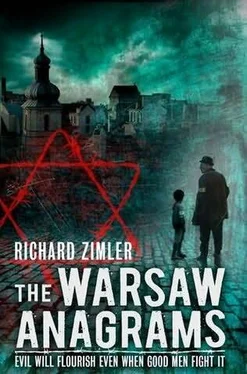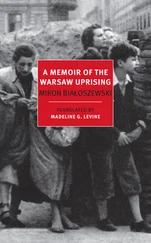She told me her name was Naomi. ‘Are you Czech?’ she asked me.
‘Originally, but I’ve lived in Warsaw for twenty years now.’
My lie was a key clicking open a lock – the rusted one imprisoning me in myself. I felt as if I’d escaped a trap whose existence I’d failed to notice until now.
Mikael Tengmann saw Naomi and two more patients before coming out to see me. It was a few minutes before six. By then, the nurse – Anka – had warmed to me and made us a pot of tea. I was on my second cup and was sipping it – as I’d learned from a Russian friend in Vienna – through a sugar crystal I kept between my teeth. The crystal was a gift from Anka.
‘Hello, Erik!’ Mikael exclaimed, shaking my hand exuberantly. He wore a white medical coat but kept woollen slippers on his feet. ‘Sorry to have made you wait.’
‘That’s all right,’ I replied. I took out what was left of my crystal and sealed it in an old receipt I had in my pocket as though it were a precious gem, which made his eyes radiate sympathetic amusement.
‘I expect you want to talk about Stefa,’ he said.
‘Yes. I’m very grateful you came to see her. I want to buy serum for her. How long will it take you to get some?’
‘A day or two. I know a young smuggler who specializes in medications. I’ll get him right on it. But, Erik…’ Mikael grimaced. ‘It’s expensive – a thousand złoty.’
‘I know – Ewa told me. I promise I’ll have the money for you tomorrow – the day after, at the latest.’
He waved away my concern. ‘I trust you. The important thing is for Stefa to get well.’
Turning to his nurse, who was writing in the office appointment book, he said, ‘Anka, I’m sorry to have kept you so late today. You can get going whenever you want.’
‘Yes, Doctor,’ she replied, smiling warmly. ‘Thank you.’
‘Listen, Mikael,’ I said, ‘I also need to talk to you about a girl named Anna Levine. Rowy Klaus told me she might have come to see you.’
‘Anna Levine? I can’t recall her.’
I took out my photograph and handed it to him. Mikael put on his tortoiseshell glasses, and I noticed now they were on a chain made of linked paper clips.
‘Classy chain,’ I commented.
He laughed brightly. ‘Helena made it for me.’
Jealousy surged inside me, but I hid it as best I could. He studied the photograph. ‘I remember this girl,’ he told me, ‘but Anna wasn’t the name she gave me.’ He handed me back the picture. ‘And she never mentioned any chorus.’
‘That seems odd.’
‘Erik, I think we’ll be far more comfortable in my office,’ he said, gesturing me towards the open door at the back.
I sensed he didn’t want Anka to hear any more of our conversation.
Once we were in his office, he offered me the chair in front of his cluttered desk. ‘Make yourself comfortable.’
Behind Mikael were his sensual photographs of the Alps, and I speculated now that they were to remind himself that a monumental natural world – far beyond the control of the Nazis – still existed. And was waiting for him.
Sitting down, I asked, ‘So what name did the girl give you?’
‘I don’t think she even gave me a name,’ he replied, taking off his medical coat and hanging it on a hook. ‘Whatever the case, I didn’t write it down.’
‘Why not?’
‘Because she asked me not to take any notes about our conversation.’
He took a cigar from the box on his desk and offered me one, but I was feeling too tired to make the effort. ‘If I remember correctly,’ he continued, ‘she came here without an appointment.’
‘So you’d never seen her before?’
‘No.’ Kicking off his slippers, he sat down and leaned back with a grateful sigh. ‘How do you know her?’ he asked.
I told him about my conversation with Dorota, focusing on Anna’s relationship with Paweł Sawicki. Mikael lit his cigar, sucking in so hard that his cheeks hollowed. He looked like the eccentric doctor in a children’s story – off-kilter and endearing. Or was he making a great effort to appear that way and was someone else entirely? I again felt as though I’d wandered on to the stage set of a play, and that everyone had his lines but me.
When I finished my account, Mikael said in a horrified voice, ‘This place, this time we’re living through, it defies description.’ He stood up, went to the window and opened the pane, taking in a bottle of vodka that had been chilling on the outside ledge.
‘May I pour you a drink?’ he asked, carrying the bottle to his desk.
‘No, thank you. If I had any vodka, I’d fall right to sleep.’
He laughed sweetly. ‘Still, you should have a smidgen.’ He held his thumb and index finger an inch apart to indicate how much – the gesture of a man used to coaxing children to take their medicine. ‘It’ll help you relax,’ he added. ‘And keep you warm.’
Why are you being so nice to me ? I wanted to ask. It should have been obvious to me that everyone sensed that I was barely hanging on, but it wasn’t.
‘I’ll have a drink in a little while,’ I told him.
Sitting down again, he took an amethyst-coloured shot glass from the bottom drawer of his desk and poured himself a drink. After gulping it down, he licked his lips like a cat. Added to his kindness, the intimacy of that gesture – as if we’d been friends for ages – undid me. ‘Please help me, Mikael,’ I pleaded, and hearing my suffocating tone of voice made me want to run.
‘Listen, Erik, I’ll help you any way that I can, but I can’t tell you why the girl in your photograph came to me – at least, not precisely. I promised her that what we discussed would be kept secret, which is why I didn’t keep a file on her. All I can really tell you is that she had a problem for which she needed a physician’s help.’
‘Did her mother know what was wrong with her?’
‘I honestly don’t know.’
‘Was she very ill?’
‘Erik,’ he said gravely, pressing his palms together in a beseeching manner, ‘don’t make me lie to you.’
‘She was very thin – her mother said she’d stopped eating. But maybe she couldn’t eat because of dysentery. Was that it?’
‘Erik, please stop!’
Despite Mikael’s plea, speculations as to the source of Anna’s troubles kept scattering through my head, though nearly all of them seemed ridiculously improbable. I even imagined that she was being slowly poisoned.
‘Could she have gotten pregnant?’ I finally asked. ‘Was that why she was so desperate?’
‘No,’ he replied sourly.
He took a long puff on his cigar, then picked a shred of tobacco from his tongue. His gestures were quick and sure – the movements of a confident man who practised a valued profession, and whose grandchild was still alive.
I slapped his desk. ‘Damn it! Someone must have known what was wrong with her! Please, Mikael, the Nazis cut off her hand!’
I knew I was making a scene, but I couldn’t help myself. I wished I hadn’t ever given him my real name; having a false identity would have enabled me to plead more desperately – or even threaten him.
Shaken, the physician put on his spectacles and refilled his glass slowly.
‘Just tell me if she said anything about my nephew. I’ve a right to know that.’
He looked up, astonished. ‘So they knew each other?’ he asked.
‘I can’t be sure. Though there’s one link between them – the chorus.’
‘I see what you mean. But in that case, Rowy would be the person to talk to.’
A knock on the door interrupted us. It was Mikael’s nurse. ‘If there’s nothing else, I’ll be going, Dr Tengmann,’ she said.
‘Thank you, Anka. Goodnight.’
Читать дальше












